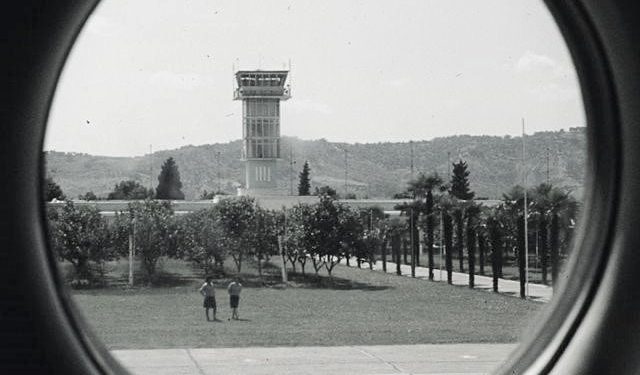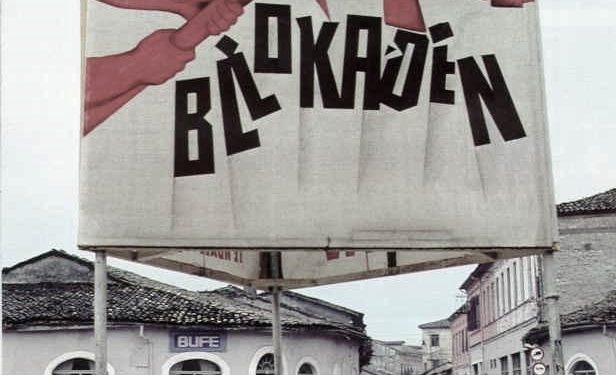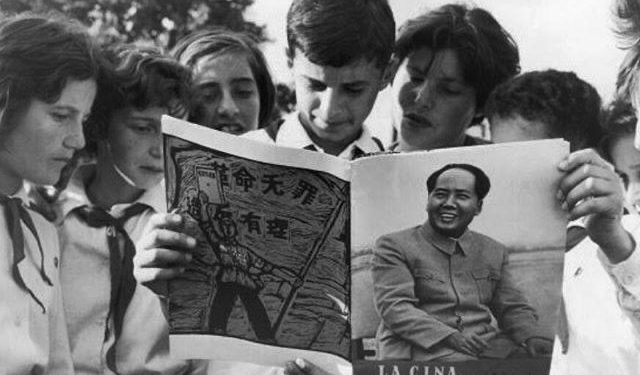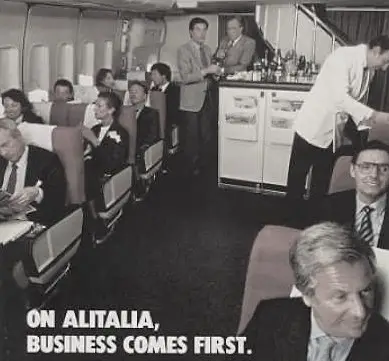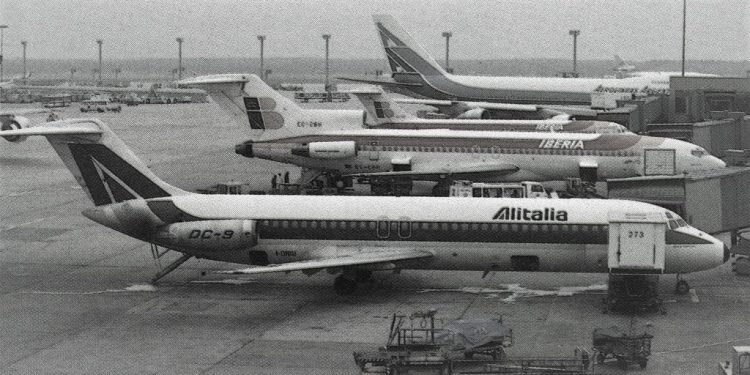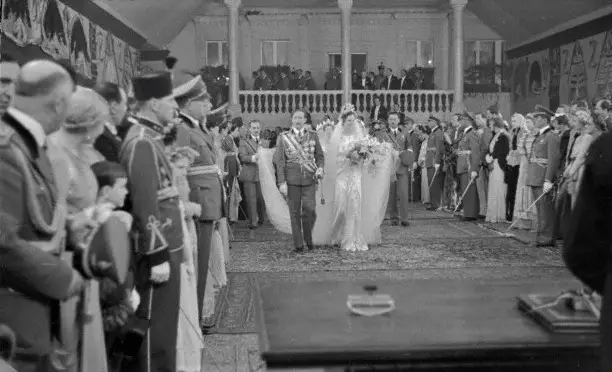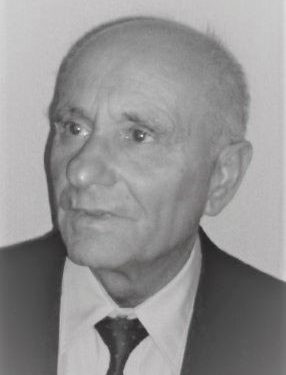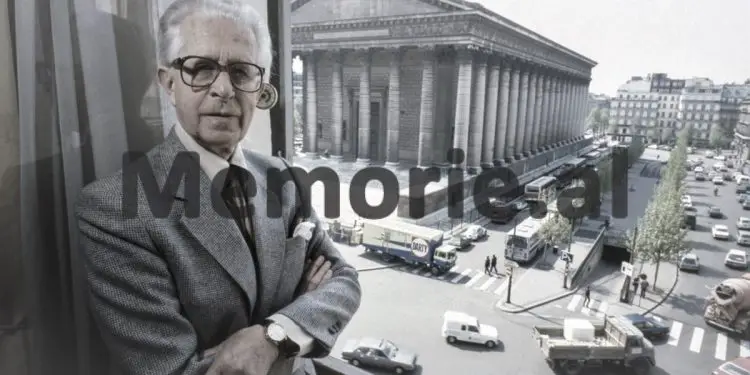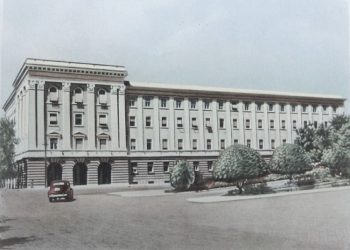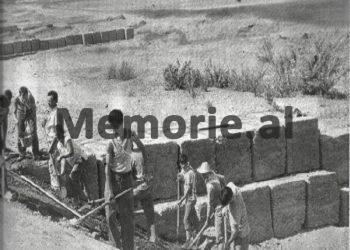By Sven Aurén
Translated by Adil N. Bicaku
Swedish journalist Sven Aurén, in the newspaper ‘Svenska Dagbladet’ Stockholm, writes from his fourth visit to Albania in September 1968.
TOWARDS COMMUNIST ALBANIA IN 1968
Memorie.al/ The engines are roaring, the sunlight is dancing on the wings of the plane and down in the Adriatic, the white geese are shining. Behind us, the Italian coast is gone. But to the east, high above the horizon rise the blue mountain ranges. What we have ahead of us is Albania: China’s satellite in Europe, the last Stalinist People’s Republic in the part of our world. Which day of the week? Clearly, a Tuesday, because only on Tuesdays, you can travel to Albania. As far back as 1968, there is a country in Europe – as large as Belgium – that is far from owning a flight agency and does not even have a passenger plane.
It is the Italians who decide on the frequency of traffic. Once a week, an Italian company flies on the Rome-Tirana line and always with a half-full plane. Every Tuesday, the same thing happens at Tirana airport, as soon as you get off the flight, I have to hurry to get back immediately, so the stay at the airport is less than half an hour. This plane, once every seven days, heads for the road to Albania, as if it were in the service of transport for food supply, of an isolated expedition at the North Pole, constitutes the only connection with Western Europe. But that is also very distant. Although the distance between the Italian and Albanian coasts is only a few miles. Measuring it with another meter is endless. Clearly, today’s Albania is one of the most distant countries in the world.
I am on the plane of Tirana, when I write, as a preface, these travel notes. The flight attendants, satisfied that they know they will be back in Rome soon, are generous with both a smile and a drink. Meanwhile they do not need to work hard. The passengers are few: a pair of Italian diplomats, one of whom, clutches a mail bag to his chest, as a parent hugs his child, a bearded gentleman from the Sorbonne, who is said to have written a special, enthusiastic article about the Hero National, Skënderbeu and for this reason, has been officially invited by the Albanian state, as well as some Albanians whose status is difficult to determine. Finally the list of passengers contains a collective trip in which I am part, as a tourist among others.
What does a journalist have to do with a travel group? It is not easy to enter the Albanian borders. They are the most closed in Europe, probably all over the world. For many years, the benevolent chiefs of the embassy have tried to issue me an individual visa. Applications, phone calls and private conversations, without exception, have all resulted in Albania’s usual response when it comes to visas for hungry Western journalists: the request is under consideration. Months and years pass and nothing happens and over time evens this lack of reaction, takes on an almost normal character.
In the Paris Embassy alone, the unanswered requests of hundreds of journalists are already on the rise. But when you recall these events, it is not hard to understand, that I was surprised, when by chance, I saw in a window of a simple travel agency, on the Boulevard Opera (Avenue de L’Opera), which was for the native states. In a secret corner, as if it was not the purpose to be seen, there was a poster announcing a trip to Albania. The trip was two weeks by bus, visiting all major cities and communities…!
An appropriate question, really just to register, but it was not a question of departure, before the list of participants was approved by the Albanian embassy. That this institution, which had already become the object of so many fruitless efforts, would accept my name, in this new case seems of course impossible. But perhaps a new passport, with data from another profession, than this red robe marked “journalist”, for example, “writer”, would not stand out so much?
This happened. And yet, this is the explanation that I am on my way to a communist state, which for so long has refused to accept me. I go with the label, as a tour group and that sounds a bit vulgar. But together my travelers cannot be considered ordinary tourists. People, who want the normal, almost do not go to Albania. In addition, the group is extraordinary in another respect as well. Albanians are the only people in Europe who have Mao’s red book on the dresser. It would have been more reasonable for the Sorbonne’s revolutionary students to seize this opportunity and make contact, with a Chinese-inspired nation.
Quite strange, that there is no young man of that type in our group. Are they afraid that their illusions will fade away? There are neither communists nor those, with sympathetic communist leanings, who a priori have decided to find him, the most wonderful. These are schoolteachers, a young couple who specialize in applying for patents, in their home states, a 78-year-old engineer with his wife, who make strange life trips and a former judge from Orleans. , who is quite blind and is led by his caring wife, who looks at both of them and tells them about everything.
There is also a middle-aged man, a postman of general interest, from the thirteenth arrondissement of Paris, who has been angry for a long time because he never found anything to read about Albania in the morning bulletin he decided to take matters into his own hands. It’s mostly a charming French band, when they’re fine. But although still in the future, it seemed impossible for a journalist, to make an individual visit and a group of travelers, offers the only chance, to look within the borders, you can of course insist, that journalism and collective travel, s ‘have something in common. In a communist dictatorship of this extreme model, it seems that such a journey means that the authorities reveal what they want to reveal and hide others.
To take full advantage of at least what I am allowed to see, meanwhile, I have taken a number of preparatory measures. There are diplomats from different countries, who have recently been stationed in Tirana, as well as specialists, who have had various services in Albania. Thanks to informants of this type, I am armed with prior knowledge of the current situation. In the meantime, there are several possibilities to compare, between the present and the past. This is my fourth trip to Albania. ‘On revienz toujours’.
At a young age, I met an Albanian student in Paris and then, I spent a week at his house in Tirana. The visit left me with such strong impressions that a few years later, I went back to write a book about the country. The third visit, I made shortly before the war, when I traveled by car, from Stockholm to attend, the picturesque wedding of King Zog, with the Hungarian princess Apony (Apponyi). This was in April 1938. Immediately after a year, the Albanian state disappeared from the waves of war, was deserted, fragmented and finally returned to its current form.
To this Albania of yesterday, to which I paid so much interest, was an unknown and primitive Balkan nation, with a million inhabitants, which always calls itself, Albanian: the sons of eagles. With over Two-thirds Mountains, barren and nearly one-third cultivated, in valleys and coastal belts, it was also a very poor place. Throughout its history, it has been on the path of major conflicts of interest of the great powers. That the Albanians, who are the descendants of the Illyrians, were able to preserve both their language and national features, for example, living habits, even physiognomy is a miracle! Directly or indirectly, they have always been colonized.
They were ruled by the Greeks, Romans and Byzantines. For five centuries, until 1912, the land was Turkish-owned. During World War I, it served as a battleground for superpower armies. In the 1920s, for the first time, it gained, at least ostensibly, a form of political independence. The social structure was feudal with a number of rich highland leaders as dominant figures. In 1928, the mountain leader Ahmed Zogu was able to persuade other strong leaders to accept the formation of a Monarchy, where he was proclaimed King by the name of Zog I.
The permanent tragedy of the country is that it has never been able to survive without foreign funding. Zog ruled, but Mussolini paid, turning the country’s first King into an Italian vassal. In 1939, the vassal was not so obedient, so he was expelled and the country turned into an Italian colony. But during my visit, in the thirties, there was still the untouched throne placed in a salon at the Royal Palace in Tirana, which looked like an average Djurs’holm villa.
When you are sitting like this, in an airplane seat, on the way to a new Albania, where the knowledge about it is only of a theoretical nature, it is natural for the past to come to mind as a show. Is there anything left of the fascinating Balkan state? But the magnificent landscape of the country must have remained as well:
- Another trip (French).
- Villa neighborhood on the outskirts of Stockholm. The rich class lives.
Adventure mountains, winding roads, those deep blue lakes, in Shkodra and Pogradec, stone bridges bent, like angry cats, on the slope of gorges, eagles, flying around the ridges of massive mountains, those green valleys, with fields there with sunflowers, tobacco and corn…
But people, atmosphere? Before the war, travelers to Albania were quite small and in their home countries, they were considered extravagant, romantic or adventurous. In Albania they were kings. They were welcomed as honored friends. Rich and poor, competing to open doors, shining with pleasure, readiness was total. Generosity was raised in religious dogma. At one time, even blood feuds were left behind, which was painful and devastating the country, like cholera, and led to the extinction of both families and tribes. If the victim, who was to be killed, managed to get inside the enemy’s house, before he could shoot him, he took advantage of the habit of hospitality, as long as he stayed there.
Albanians liked to photograph them and wanted to give gifts. They gave us fishes, wherever we went. Fukaren people, most of them were almost Fukaren, so much so that they could not imagine behaving with a worthy, magnificent pride. The zealots roamed the village road, like princes. In terms of colors it seemed that the picture was sublime. I remember the market of Shkodra, one morning in April: Highlanders in white sheepskin clothes, black glasses, sleeveless and oval headbands, women with straight foreheads, black pitch and laborious clothes, to bring to mind to the Eskimos of Greenland. Women from Malësia, with oily hair and fringe on the forehead and a strange belt with pafts, capraze, serme nizamçe and tin rivets…!
This Albanian carnival, which was not a carnival, except for an ordinary colorful day, would fascinate a costume historian. You can see such scenes in other places in the Balkans, but nowhere were they as intense and fantastic as in Shkodra. It depended on the isolation of a small state, which Europe had completely forgotten.
Even King Zog, who never wanted to be called “King of Albania”, as he insisted on being called “King of the Albanians” thinking of the Albanian minorities in Greece and Yugoslavia. I see him, on his wedding night, in the palace in Tirana: a Buster Keaton, an Albanian with a stiff face, without emotions and covered with decorations, so much so that the shining star hangs down to the bottom of the hood, the uniform. Next to this knight, with a serious look, a tall, beautiful, slender girl, who looks extremely excited, that she has become queen though in a Monarchy, operetta.
Behind the couple, a puffy Italian in a fascist uniform, with his chest forward and a smug smile, on his healthy face: Mussolini’s son-in-law, Count Ciano. The count was the godfather of the marriage. No one could have imagined what fate awaited them. This godmother would return with an invading army and force the royal couple into exile, and he himself, after a few years, would sit in a chair, at a place of execution, in northern Italy and be shot in the back as traitor.
The atmosphere was great even though there was an owl, such as the French minister, who could not contain himself and laughed out loud when he saw the wedding gifts: six saddle horses, from the Hungarian state, a motorboat, from the Duce (Il Duce) and a ‘Mercedes’, from Hitler. “The donors seem to have had the same thought in their heads: It is better to give them something to serve them in case they are forced to leave the country.” The dance began with the tunes of the Royal Court Orchestra and an orchestra, which had been brought by the bride from Budapest.
Diplomatic representatives from twenty nations danced waltzes with the ladies of the Albanian aristocracy, while the walls were surrounded by mountain leaders, dressed in national costumes, embroidered with gold and with belt pistols. Some of them completed the pistols with a gold fountain pen, which at the time meant that the person in question knew how to write. The tops of the minarets were decorated with floodlights and decorative strings. Large balloons, with the portrait of the royal couple, hovered on the roofs of houses and at the airport of Tirana, threw excellent fireballs of the best Italian brand.
Tirana Airport
We are already there. Fasten your seat belt; turn off your cigarettes, signores et signorinas. The capital of Albania, they lie inside a mountain cauldron. The plane sinks to the bottom and touches the ground. It was on the evening of Zog’s wedding, when I saw this airport, last time. Then there were a crowd of cheerful people, admiring the rockets and fireworks in the sky. No airport was seen then except for people. What about now?
I look around through the open door. It is now deserted, like an abandoned square, for emergency discounts. No aircraft other than tuna. No man, except a melancholy soldier, who is leaning on his rifle. No building except a house, like crowned kiosks, with a red star. Memorie.al
The next issue follows




